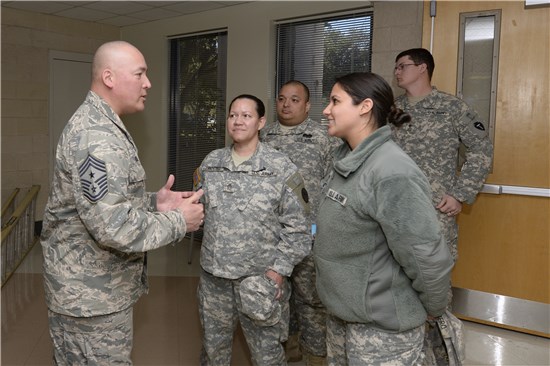 |
| National Guard Bureau senior enlisted leader Command Chief Master Sgt. Mitchell Brush takes time to meet with Staff Sgt. Nayda Troche, center, and Spc. Jennifer Cubero, Texas Medical Command, Texas Army National Guard, after his town hall meeting held at Camp Mabry in Austin, Texas, Feb. 9, 2014. Brush discussed the value the National Guard brings to the nation, both abroad and at home, and the importance of looking out for each other to help reduce the numbers of suicide within the ranks. Brush also opened up the floor to questions or concerns by service members in the audience. (U.S. Army National Guard photo by Sgt. 1st Class Malcolm McClendon) |
Story by: Sgt. 1st Class Malcolm McClendon
AUSTIN, Texas – The National Guard’s senior enlisted adviser, Command Chief Master Sgt. Mitchell O. Brush, held a Town Hall meeting for Texas National Guardsmen at Camp Mabry in Austin, Texas, Feb. 9, 2014.
Brush discussed various topics varied from suicide prevention to force structure and specifically highlighted the vital role the National Guard plays both home and abroad.
“Since 9/11, 800,000 deployments have been filled by National Guardsmen,” said Brush. “We total only 453,000 both Army and Air National Guardsmen [at any given time], meaning multiple deployments for some.”
The senior enlisted advisor explained to the Guardsmen in attendance that these deployments differ from those of the active duty forces.
“When we deploy, we cost the same as an active duty component,” Brush said. “However, when we’re done, we go home; we go back to our communities. This makes us cheaper.”
Brush is referring to the National Guards’ ranks, composed of part-time service members who have full-time civilian jobs and careers. This allows the force to have ready trained citizen-soldiers and airmen without having employ them on a full- time active status.
In a time of budgets cuts and reduction in missions, Brush believes this is the Guard’s key message to help the fight for funding for its programs.
He reassured the Texas National Guardsmen that this is a top priority for him and Gen. Frank J. Grass, Chief of the National Guard Bureau.
“Let us worry about force structure,” Brush said. “You guys out here need to concentrate on what you do really well.”
Brush shared a conversation he had with Grass about things that keep him up at night. Instead of responding with budgets and sequestrations, as Brush had assumed, Grass responded with, “Mother Nature.”
“A catastrophic event that will take out three-quarters of the United States,” Brush said. “This is what he worries about.”
The National Guard plays a vital role in support of civil authorities during emergency situations. These can be anything from hurricanes, floods, ice storms and even chemical, biological, radiological, nuclear attacks.
Just one more thing that makes the Guard so valuable, Brush believes.
Spc. Jennifer Cubero, Texas Medical Command, Texas Army National Guard, attended the town hall and appreciated the visit from Brush.
“The fact that we have people at the national levels fighting for us is comforting,” Cubero said. “Regardless of budgets, I feel that they are trying to let the nation know what we do and what we bring to the fight.”